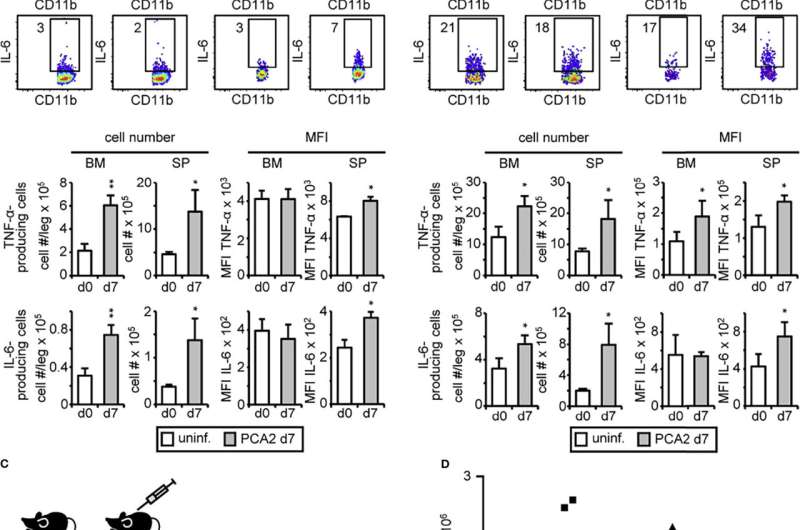C. albicans PCA2 infection generates trained monocytes with a higher proinflammatory cytokine response. Intracellular detection by flow cytometry of TNF-α and IL-6 in pre-gated monocytes after stimulation of total RBC-lysed bone marrow cell or splenocyte cultures with (A) inactivated C. albicans yeasts or (B) LPS, for 6h with brefeldin A for the final 4 h. Dot plots indicating the % of cytokine-producing cells are shown, as well as the total cell numbers and the MFI of cytokine-producing cells in the bone marrow and spleens from 7-day PCA2-infected mice and uninfected mice. Data are presented as mean plus SD of 3 mice, and statistical significance was assessed by Student’s t test (*P < 0.05, **P < 0.01). (C) 30 million RBC-lysed bone marrow cells or splenocytes were obtained from uninfected or 7-day PCA2-infected mice and adoptively transferred to uninfected mice, 3 days later mice were i.p. infected with 30 million of ATCC 26555 yeasts and CFUs were measured in the kidneys after 4 additional days. Non-adoptively transferred mice served as controls. (D) Fungal burden in the kidneys expressed as CFUs per gram of tissue (n = 9-16). Statistical significance was assessed by one way ANOVA followed by Dunnett’s test for multiple comparisons. Credit: DOI: 10.3389/fimmu.2021.790309
The research group Immunology of Fungal Infections at the University of Valencia (UV) has investigated a fungal vaccine with which to train stem cells and hematopoietic progenitors (which produce all the cells of the blood and lifelong immune system) to improve the immune response to infections. The work has been published in the journal Frontiers in Immunology.
In this work of the University Institute of Biotechnology and Biomedicine (BIOTECMED) and the Department of Microbiology and Ecology of the UV, a model of vaccination in mice with a non-virulent strain of the fungus Candida albicans has been used, and demonstrated the protective capacity against future infections independently of specific immunity (development of T lymphocytes and B lymphocytes producing antibodies specific for the pathogen).
"What we see is that vaccination trains stem cells and hematopoietic progenitors in the bone marrow and then travels to the spleen, where they are able to produce large amounts of improved mature cells to fight infection," explains Alberto Yáñez, Ramon y Cajal researcher at the UV and director of this work.
"In previous studies, our group showed that these cells are able to directly detect the opportunistic pathogenic fungus C. albicans and respond by producing a greater number of innate immune system cells, important for eliminating the fungus. In addition, we observed that the function of these cells was improved to fight the infection," indicates María Luisa Gil, professor of the Department of Microbiology and Ecology of the UV and co-author of the study.
State-of-the-art technology consisting of RNA sequencing of individual cells has been used to find the action mechanism of the vaccine in this training. With this, it is possible to determine the changes in gene expression that each of these stem cells undergo during vaccination and the response to an infection with a virulent strain of the fungus. This analysis has pointed to the growth factor GM-CSF (a type of hormone-like substance that helps the bone marrow produce new blood cells and is created during vaccination), as responsible for programming the cells. Stem cells and hematopoietic progenitors to increase their protective capacity.
"The results of this study highlight the importance of stem cells and hematopoietic progenitors in the protective immune response to infections," said Cristina Bono, the first author of the article and a UV predoctoral researcher. "In addition, these results could help design more effective immunotherapies in the future, including the development of enhanced vaccines, to enhance the immune response to various infections, including COVID-19," says Alberto Yáñez.
More information: Cristina Bono et al, GM-CSF Programs Hematopoietic Stem and Progenitor Cells During Candida albicans Vaccination for Protection Against Reinfection, Frontiers in Immunology (2021). DOI: 10.3389/fimmu.2021.790309
Journal information: Frontiers in Immunology
Provided by Asociacion RUVID























